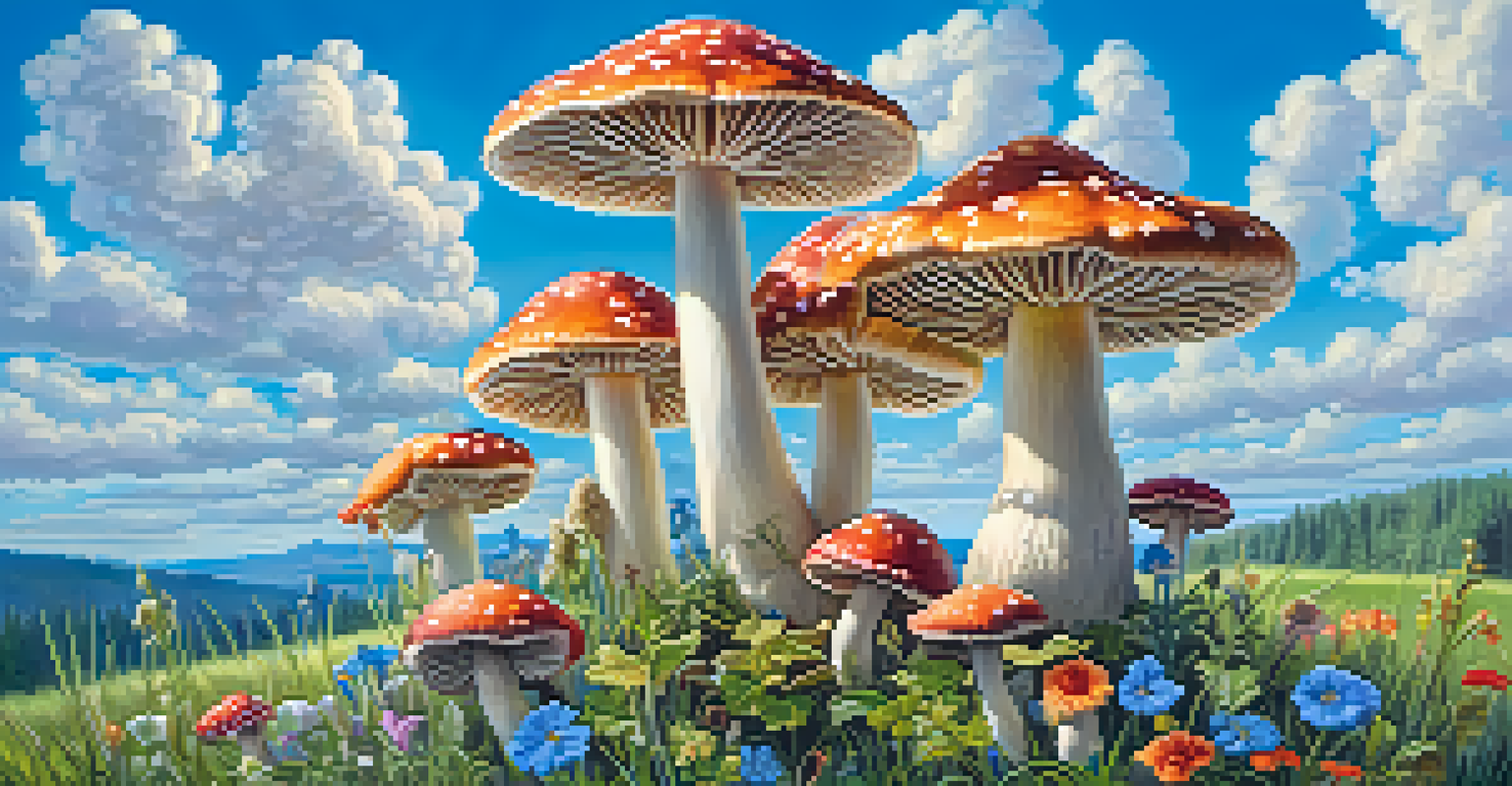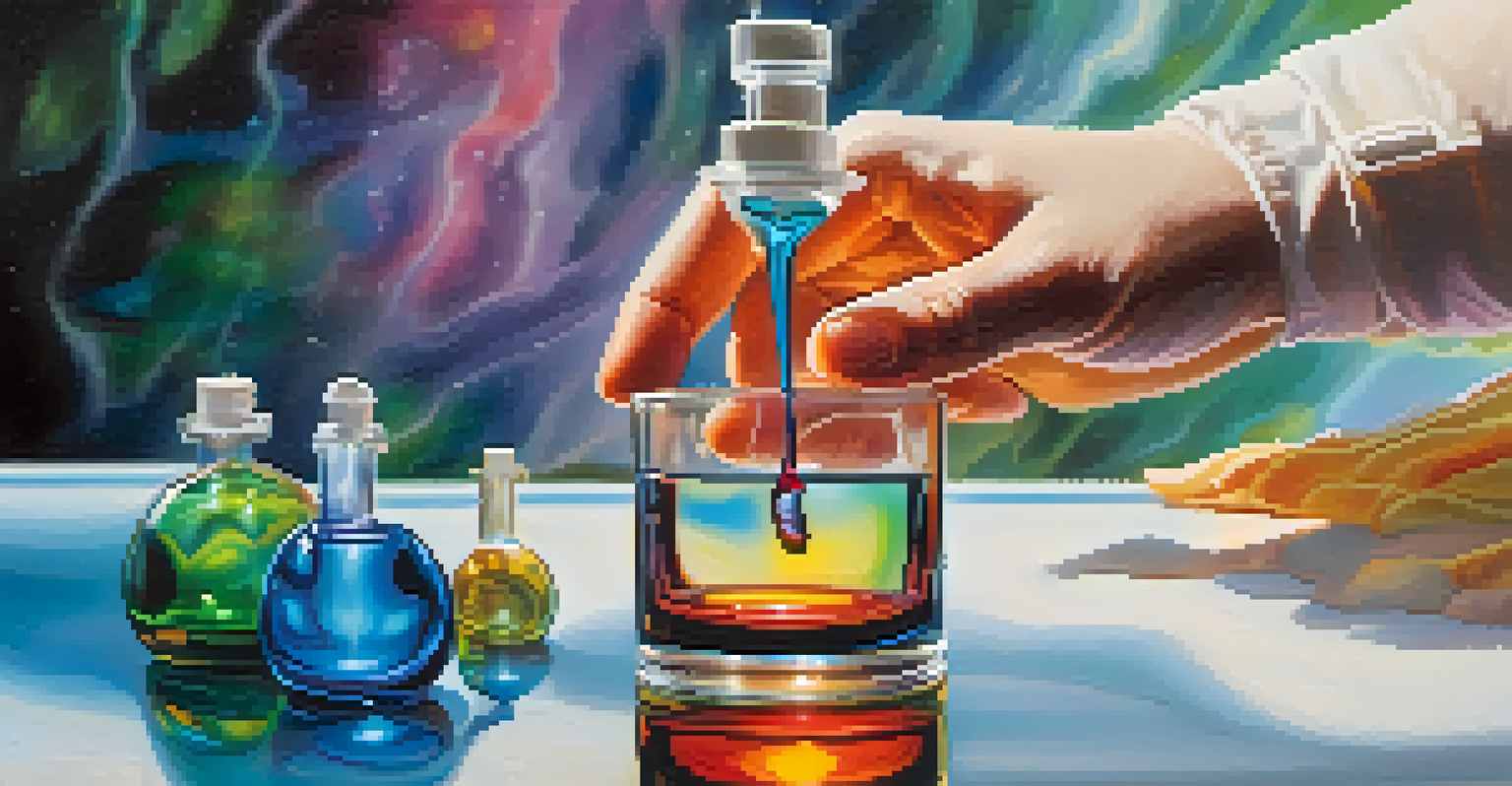Entheogens and Their Role in Shaping Modern Social Movements

Understanding Entheogens and Their Historical Context
Entheogens are substances that induce altered states of consciousness, often used in spiritual or religious contexts. Historically, cultures around the world have utilized these substances, such as peyote in Native American rituals and psilocybin mushrooms in Mesoamerican ceremonies, to foster a deeper connection to the divine. This rich history provides a backdrop for understanding their contemporary relevance.
Psychedelics are not a panacea, but they can help us to see the world in a different way, and that can lead to a better understanding of ourselves and our place in the universe.
As society evolves, the use of entheogens has transitioned from exclusive spiritual practices to broader social contexts. In the past, these substances were often stigmatized, but recent shifts in perception have led to renewed interest in their potential benefits. This change is fueling discussions around mental health, personal growth, and social cohesion.
By examining how entheogens have been integrated into various cultures, we can appreciate their role as tools for enhancing awareness and community bonding. Their historical significance is a vital piece of the puzzle in understanding their resurgence in modern social movements.
The Resurgence of Interest in Psychedelic Substances
In recent years, there has been a remarkable resurgence in the interest surrounding entheogens, particularly psychedelics like LSD, psilocybin, and ayahuasca. This revival is partly fueled by groundbreaking research that highlights their therapeutic potential in treating conditions like PTSD, depression, and anxiety. As the stigma surrounding mental health continues to diminish, so too does the stigma surrounding these substances.

Notably, cities like Denver and Oakland have decriminalized psilocybin mushrooms, reflecting a growing acceptance of entheogens in society. This shift indicates a broader societal movement towards recognizing the benefits of these substances, not just for individual healing but also for collective social change. The conversation is evolving from one of fear to one of exploration and acceptance.
Entheogens' Historical Significance
Entheogens have a rich historical background, utilized by various cultures for spiritual practices, which informs their contemporary relevance.
The renewed interest in psychedelics is not just a trend; it’s a cultural shift rooted in a desire for growth and understanding. As more people advocate for their responsible use, entheogens are positioned to play a significant role in reshaping societal norms and perspectives.
Entheogens and Their Impact on Mental Health Advocacy
Mental health advocacy has gained momentum in recent years, with entheogens emerging as a key player in this narrative. Many individuals have reported profound experiences with these substances that have led to significant shifts in their mental health and overall outlook on life. These testimonials are powerful, often serving as catalysts for change within communities struggling with mental health issues.
The greatest gift of the entheogen is its ability to reveal the interconnectivity of all things.
Organizations and researchers are increasingly exploring the therapeutic applications of entheogens, conducting studies that demonstrate their potential to facilitate healing and personal transformation. This research is essential in legitimizing the use of these substances, drawing attention to their role in addressing the mental health crisis many societies face today.
As mental health advocacy continues to grow, entheogens are becoming an integral part of the conversation. They represent not just a means of healing but also a way to challenge societal norms and stigma surrounding mental health treatments.
Entheogens as Tools for Social Justice and Activism
Entheogens have also found their place within social justice movements, offering unique perspectives and experiences that challenge the status quo. Activists argue that these substances can enhance empathy, foster understanding, and encourage collective action, essential components for any successful movement. In many ways, they serve as a bridge connecting individuals to a larger purpose.
For instance, during protests and gatherings, some activists have incorporated entheogenic experiences into their practices to deepen their connections to one another and the causes they support. This approach emphasizes the interconnectedness of all beings, reinforcing the idea that social change requires unity and shared understanding.
Psychedelics in Mental Health
Recent research highlights the therapeutic potential of psychedelics, sparking renewed interest and advocacy for their use in mental health treatment.
By using entheogens as tools for social consciousness, activists strive to create a more compassionate and equitable world. They challenge participants to reflect on their roles within the larger societal framework, ultimately driving movements toward a more inclusive future.
The Role of Community in Entheogenic Practices
Community plays a crucial role in the practice of using entheogens, as these substances are often experienced in group settings. Sharing these experiences with others can create powerful bonds, fostering a sense of belonging and shared purpose. This communal aspect is vital, especially in a world where isolation and disconnection can be prevalent.
Many modern movements are adopting communal rituals involving entheogens to enhance solidarity among participants. These rituals not only provide a space for personal exploration but also cultivate a collective identity rooted in shared experiences. The sense of community that arises can be transformative, empowering individuals to take action together.
Ultimately, the integration of community into entheogenic practices highlights the importance of connection in social movements. It reinforces the idea that change is not just an individual endeavor but a collective one, rooted in shared values and experiences.
Legal and Ethical Considerations Surrounding Entheogens
As the conversation around entheogens evolves, so too do the legal and ethical considerations surrounding their use. Many advocates argue for the decriminalization of these substances, emphasizing personal autonomy and the right to explore consciousness. However, this push raises questions about regulation, safety, and responsible use.
Ethical considerations also come into play when discussing access to entheogenic experiences. It’s essential to ensure that these practices are inclusive and respectful of indigenous traditions, as many entheogens have deep cultural roots. Navigating these complexities requires thoughtful dialogue and collaboration among various stakeholders.
Community and Social Change
Entheogenic practices foster community connections, emphasizing the collective nature of social movements and the importance of shared experiences.
Addressing the legal and ethical aspects of entheogens is crucial for their integration into modern social movements. This dialogue not only helps protect individuals but also nurtures a more equitable approach to the use of these powerful substances.
Future Prospects: Entheogens in Social Movements
Looking ahead, it’s clear that entheogens will continue to shape modern social movements in profound ways. As research uncovers their potential benefits and more individuals share their transformative experiences, these substances will likely gain further acceptance in various contexts. This evolution could lead to even broader discussions about mental health, social justice, and personal growth.
Moreover, as more organizations and communities embrace entheogenic practices, we may witness a shift in how society views these substances. The future could hold a more integrated approach where entheogens are utilized responsibly and ethically, fostering healing and unity in various social movements.

In conclusion, the role of entheogens in shaping modern social movements is just beginning to unfold. Their potential to connect individuals, heal communities, and challenge societal norms could pave the way for a more compassionate and understanding world.